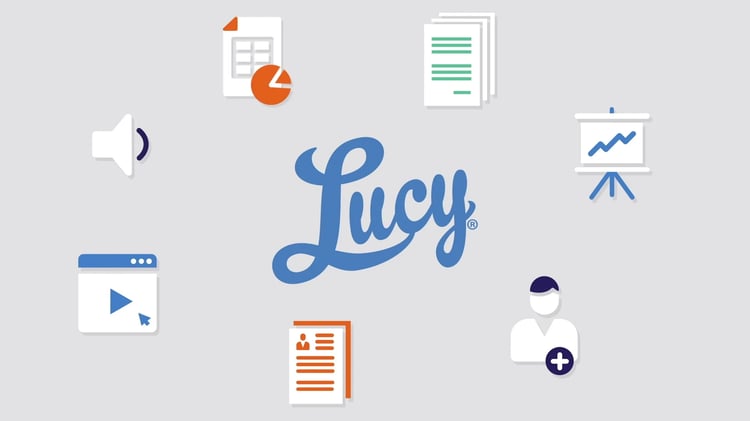
Artificial intelligence in the workplace is not a new phenomenon, the tools at our disposal just keep improving and offering wider possibilities. By now, most of us have come into contact with ChatGPT or at the very least heard of its capabilities. It's safe to say that for many, it has been an eye-opener as to the present state of AI integration with daily workplace tasks. While ChatGPT itself has been front and centre, its introduction has led companies to explore the possibilities beyond just this platform. Many other AI tools are emerging or being discovered in a new light thanks to the AI 'surge' heralded by ChatGPT. Lucy is one of them.
Originally developed in 2015, Lucy is an AI-powered answer engine. This AI tool is designed to answer questions so your colleagues don't have to, and save you the trouble of searching through company archives or drives to extract information. In terms of uninterrupted efficiency for everyone involved, it is the tool to use. Now in its fourth generation, Lucy 4 was released in December 2022, catching the eye of many with a newly sparked interest in AI tools for the workplace. Now Lucy has taken it a step further with the recent launch of LucyGPT, adding a 24/7-available 'subject matter expert' (SME) to the mix, and bringing the Lucy offering into the arena with ChatGPT and other machine learning technologies.
The questions to ask then, are how Lucy works, and why it can help your business. Let's unpack this AI tool in more detail and find out why you should consider adding it to your business's martech stack.
How does Lucy work?
Lucy falls under the category of 'generative' AI, which is AI that can create new content from text, code, or audio based when given a prompt. This is how ChatGPT works. Lucy operates in the same way, except instead of being trained in a large language model in order to extract information from the entirety of the internet, Lucy is trained to answer questions by retrieving the appropriate information from within your company's data.
What does this look like in a practical sense? It means finding the answer to a workflow or data question and receiving a response in seconds, instead of hunting through company knowledge bases or needing to ask other people, both of which waste valuable time that could be used elsewhere.
With Lucy 4 and LucyGPT, this model has become more refined and further optimised for generative AI. Instead of just pulling up information, Lucy provides the user with a two- or three-sentence answer and includes links to the information, both emulating a human response and providing a simple, succinct answer to the question. Designed to operate within a business's preferred communication platform, such as Slack, or Microsoft Teams, Lucy can be communicated with in chat format just as you would with a colleague. You can do this in a private chat directly with the tool, or mention it in a group channel, making it accessible and easy to adopt and use.
Why integrate Lucy into your business?
Scott Litman, founder and COO of Lucy stated that over 85% of employees say getting a response from a coworker can take a significant amount of time, from hours to days even. Obviously, this slows down operations significantly, wasting time that need not be wasted! Searching for information oneself is oftentimes not that much better. Let's face it, as businesses grow and scale, the organisation of data can often get away from us, meaning that manual information searches are not efficient either. A solution that mitigates both of these challenges allows your team to focus on what they do best.
Lucy is also able to integrate with a much broader range of platforms than other generative AI tools can. This is significant, especially since most companies make use of several programs in their operations. Platforms Lucy connects to include Microsoft SharePoint and Office 365, Dropbox, Egnyte, GitHub, IDC, FTP, GlobalData, Google Drive, Jira, and many more. All information across your entire enterprise is collated into a single source, regardless of how many programs you use.
Utilising a tool like this also means that employee transitions or mergers and acquisitions can be made far less disruptive. All historical data and documentation can be retrieved easily, lessening the need for major handovers. Additionally, SMEs are able to work uninterrupted to a far greater extent, as specific knowledge can be sourced without their express assistance.
Ultimately, knowledge management and data literacy are crucial for successful business operations, and Lucy is designed to optimise the process. It is a valuable tool for any business looking to boost efficiency and at NEXA, we know that is one of the most important things businesses can do. We pride ourselves on keeping our finger on the pulse with all market developments and technology, and the integration of the perfect AI tools for our clients. Get in touch with us today to find out how we can help you optimise and grow your business.
%20(1).png?width=2701&height=607&name=BRC_NEXA_LOGO_WHITE%20(2)%20(1).png)
